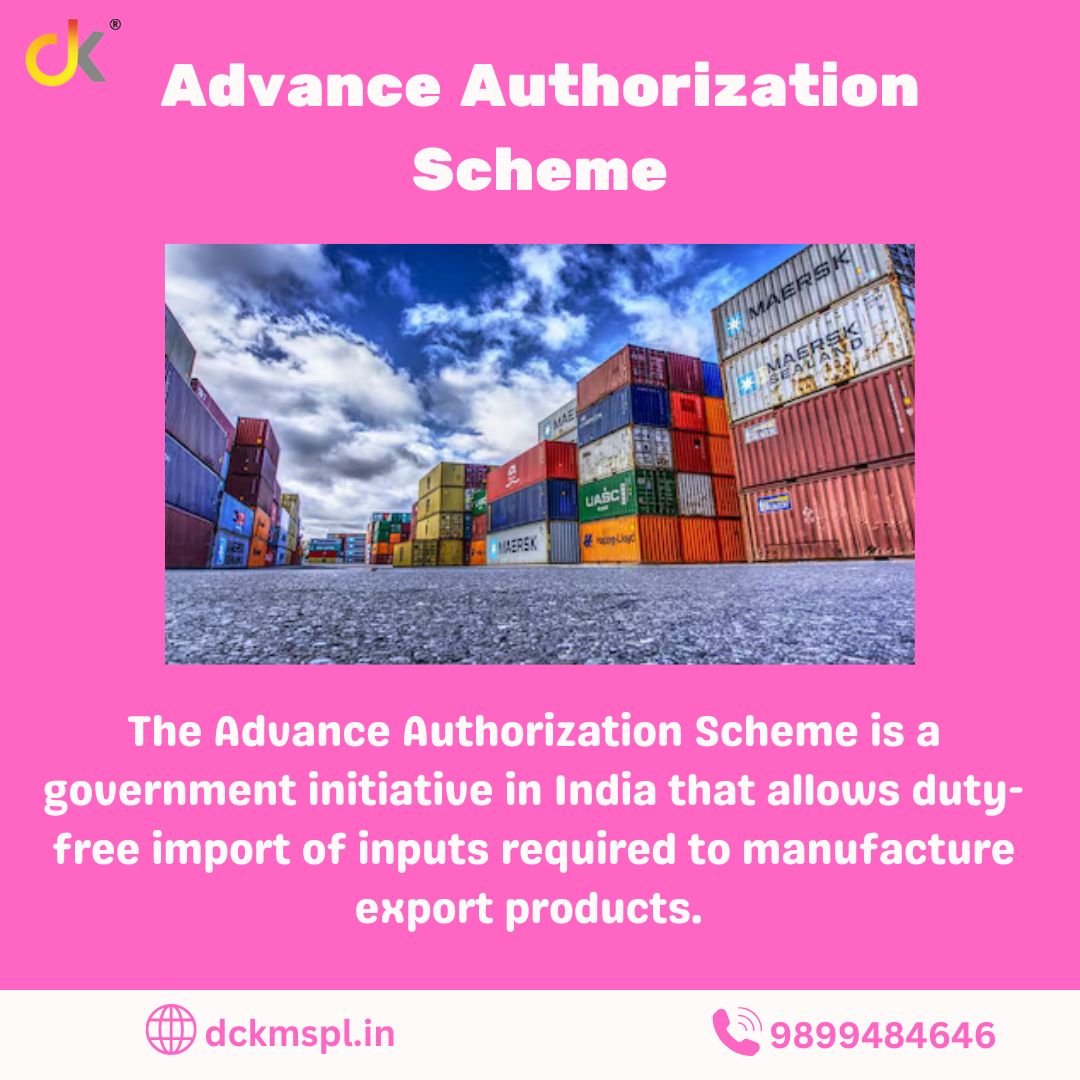The Advance Authorization Scheme is a flagship initiative under India’s Foreign Trade Policy designed to promote exports by providing duty exemptions on imported inputs used for producing export goods. The scheme enables exporters to reduce production costs, enhance competitiveness in the global market, and support the government’s vision of boosting foreign trade. This comprehensive guide explores the key aspects of the Advance Authorization Scheme, its benefits, application process, and its importance for exporters.
What is the Advance Authorization Scheme?
The Advance Authorization Scheme allows manufacturers and exporters to import raw materials, components, or consumables duty-free for the production of export-oriented goods. The essential condition is that the imported items must be used exclusively in the manufacturing of export products.Introduced to facilitate export-oriented businesses, the scheme is particularly advantageous for sectors reliant on imported raw materials, such as textiles, chemicals, engineering, and electronics.
Objectives of the Advance Authorization Scheme
- Promoting Exports
The scheme aims to make Indian goods competitive in international markets by reducing production costs through duty-free imports. - Encouraging Value Addition
It incentivizes domestic industries to create value-added products that meet global standards. - Streamlining Trade Processes
By reducing the tax burden, the scheme simplifies the operational processes for exporters. - Supporting Economic Growth
Enhanced exports contribute to the country’s GDP and foreign exchange reserves.
Key Features of the Scheme
- Duty Exemptions
The scheme allows duty-free import of inputs required for export production. These include:- Basic Customs Duty (BCD)
- Additional Customs Duty (ACD)
- Anti-dumping and safeguard duties, under certain conditions
- Eligibility
- Exporters: Both manufacturer-exporters and merchant-exporters linked with supporting manufacturers are eligible.
- Products: Goods with a clear input-output relationship can avail of this benefit.
- Value Addition Norms
Exporters are required to achieve a minimum value addition of 15% for most products. However, specific norms may vary based on industry and product type. - Validity
The authorization remains valid for 12 months from the date of issuance. Exporters must fulfill their export obligations within this period, which can be extended under specific circumstances. - Transferability
The Advance Authorization is not transferable, ensuring that benefits are utilized by the original holder for export purposes.
Benefits of the Advance Authorization Scheme
- Cost Reduction
By eliminating import duties, the scheme lowers the cost of raw materials and production, making Indian goods more price-competitive globally. - Improved Cash Flow
Exporters can save upfront costs by importing duty-free, improving their liquidity and cash flow. - Operational Efficiency
Streamlined processes under the scheme reduce paperwork and administrative burdens for exporters. - Support for MSMEs
Small and medium-sized enterprises benefit significantly, as the scheme lowers entry barriers to global markets. - Enhanced Export Volume
Competitive pricing encourages higher export volumes, boosting revenue and market share for exporters.
Application Process for Advance Authorization
Applying for the Advance Authorization Scheme involves a step-by-step approach:
- Online Application
Exporters must apply through the Directorate General of Foreign Trade (DGFT) online portal using a valid Importer Exporter Code (IEC). - Documentation
Submit required documents, including:- Application form (ANF 4A)
- Input-output norms for the export product
- Export order or contract
- Past export performance, if applicable
- Authorization Issuance
Upon successful verification, the DGFT issues an Advance Authorization, specifying the quantity and value of inputs that can be imported duty-free. - Import of Inputs
Use the authorization to import raw materials, components, or consumables needed for export production. - Fulfillment of Export Obligation
Exporters must meet their export obligations by exporting finished goods of equivalent value within the specified time frame. - Submission of Proof
Submit proof of export, such as shipping bills and bank realization certificates, to DGFT for closure of the authorization.
Challenges in Implementation
While the scheme offers numerous benefits, exporters may face challenges, including:
- Complex Documentation
The requirement for detailed documentation can be cumbersome, especially for new exporters. - Stringent Norms
Compliance with input-output norms and value addition criteria may be challenging for certain industries. - Delayed Approvals
Lengthy approval processes can lead to delays, affecting production timelines. - Risk of Penalties
Failure to meet export obligations can result in penalties, leading to financial and operational strain.
Proposed Solutions for Overcoming Challenges
- Simplified Procedures
Streamlining application and documentation processes through digital platforms can reduce complexity. - Awareness Programs
Conducting workshops and training sessions for exporters on scheme compliance can improve participation. - Timely Approvals
Ensuring efficient processing of applications and authorizations can minimize delays. - Flexibility in Norms
Relaxing certain norms, particularly for MSMEs, can encourage broader adoption of the scheme.
Significance for Exporters
The Advance Authorization Scheme is a game-changer for Indian exporters, providing a cost-effective mechanism to enhance their global presence. By leveraging duty exemptions, businesses can:
- Compete effectively in international markets
- Strengthen their brand image as reliable exporters
- Expand their customer base and market reach
Conclusion
The Advance Authorization Scheme is a cornerstone of India’s trade policy, playing a pivotal role in fostering exports and driving economic growth. By alleviating the financial burden of import duties, the scheme empowers exporters to focus on innovation, quality, and market expansion.While challenges remain, the government’s ongoing efforts to streamline the process and address exporters’ concerns indicate a promising future for the initiative. As businesses continue to leverage its benefits, the Advance Authorization Scheme stands as a testament to India’s commitment to becoming a global export powerhouse.
